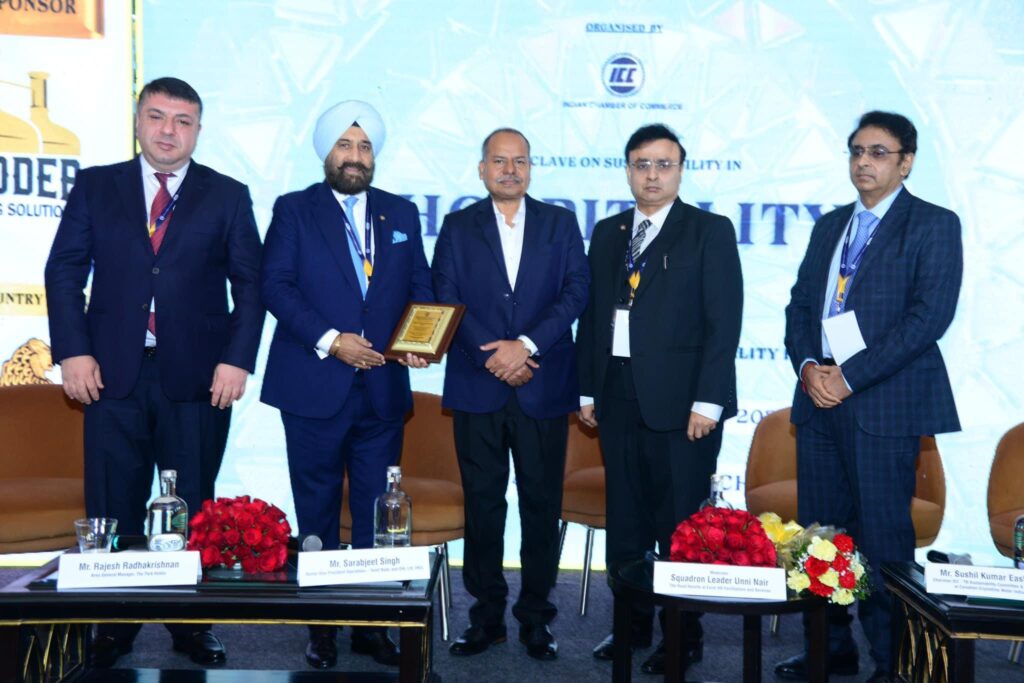Chennai: Industries need to have sustainability as the key mantra both for their survival and for having a competitive edge in the world market, said Hans Raj Verma, additional chief secretary and chairman and managing director of Tamil Nadu Industrial Investment Corporation (TIIC), on Tuesday in the city.
He was addressing a group of industrialists during the conclave on sustainability in hospitality – 2024 that was organized by the Indian Chamber of Commerce (ICC) in the city.
“Green sustainability is no longer an option or a choice. It is a compelling imperative of competitive business strategy. We have to incorporate all its dimensions into our business operations,” Verma said, urging the ICC to conduct a series of events to spread the message of sustainability across the country.
Pointing out that India’s manufacturing is only 15% of its GDP and that to make India a self-reliant nation and to achieve Chief Minister MK Stalin’s vision of achieving a one trillion dollar economy by 2030, he said that manufacturing needs to play a bigger role and the country’s manufacturing needs to go up to 25% of its GDP.
“Sustainable manufacturing is going to be the key for India’s development and for providing jobs to the youth. India is a young nation, and its youths are aspirational and ambitious. It is upon all of us to create revenues for the youth. For creating the jobs, we need the aspirations in which manufacturing is going to play an important role,” he added.
If you are not in the sustainability space, you are no longer competitive on the world market, and MSMEs can no longer be part of the global supply chains, he said.
He further said that the country needs to embed sustainability in every walk of our lives, right from being a self-help economy to energy efficiency to reducing carbon footprints to being water and energy positive.
In the compulsive scenario, new trends like the Carbon Bond Mechanism (CBM) and scope 1, 2, and 3 standards of the World Sustainability Council are being set in the manufacturing world, he said, adding that these are the trends that the sector has to negotiate around the profit and loss statements and balance sheets.
“India is a water-starved nation in the face of a very grave water crisis. So, it is very essential that we start looking at water as our key resource. We need to start recycling water so that we become water positive,” he pointed out.
Pointing out that the tourism and hospitality sectors are opening up, he said that rural tourism is going to play a big role in the future.
Hinting that foreign tourists visiting India want an immersive experience and a story to tell, he said, “Rural tourism, run by self-help groups at village level, is a very exciting business opportunity. These women provide good local cuisine and clean running water, among other things, to the tourists. This apart, India, particularly Tamil Nadu, is rich in its local traditions, history, and culture. Every village here has a story to tell.”
Not just that, the real potential of Indian heritage, especially in Tamil Nadu, is not yet fully explored, he said.
“If we can take this tourism to villages through self-help groups, it will be sustainable tourism, where sustainability has another dimension. Here, it is not just water and energy-positive but also a part of the movement for preserving the local tradition and culture and preserving local biodiversity,” he added.
Stating that there is a huge loss of biodiversity, both flora and fauna, he said that by encouraging the local youths and tourists to be a part of the local tradition, we also contribute to biodiversity conservation at the local level, water conservation, and providing money to the rural economy.
“Tourism is one of the biggest job creators. This will provide jobs to the youth, and it in turn will give them respect and empower them,” he added.
Verma also sought partnership from stakeholders, particularly from Tamil Nadu, in the hospitality sector, which has been functioning on a sustainable basis.
“We are positioning Tamil Nadu as the hub for green manufacturing. The state is blessed by green resources, including solar and wind energy. We have huge potential for off-shore winds and hydro from western ghats. With this combination, the state is in a position to give green power to industries. It in turn will enhance the competitive edge in the world’s states and be powered by the hospital sector on a sustainable basis,” he added.
Meanwhile, Marat Melikyan, deputy head of mission, embassy of the Republic of Armenia in India, said that the hospitality sector plays a significant role in global carbon emissions, and as such, it bears a great responsibility in mitigating its environmental impact.
“Despite being a small nation, Armenia has made significant strides in promoting sustainability and renewable energy. Right from implementing energy-efficient practices in our hospitality establishments to supporting eco-tourism initiatives, Armenia is committed to leading by example in the pursuit of a greener and more sustainable future,” he said.
Pointing out that the task of achieving carbon neutrality in the hospitality sector cannot be achieved by a single country, he said that it requires collaboration, innovation, and a shared commitment from all stakeholders.
Ameya Prabhu, president of the ICC, said that each and every place in the state is unique and has a great potential for religious, business, health, leisure, and beach tourism. “That’s why sustainability becomes more important. We have to ensure that natural beauty is preserved through sustainability,” he added.
In the conclave, Indian Hotels Company Limited (IHCL) and the Leela Palace group of hotels were recognized for their contributions to the carbon-neutral hospitality industry through their ‘Pathyaawater’ and ‘Aujasya water’ programs, respectively.







More Stories
Tamarind Tales Brings the Rich Flavours of South India to Life launched by Sonakshi & Kiran
Decathlon opens one of its large-format stores at Pondy Bazaar, T. Nagar, Chennai
The Bridal Retreat Makes Their Luxurious Debut into Indian Market Taking Brides on a Journey of Self Discovery